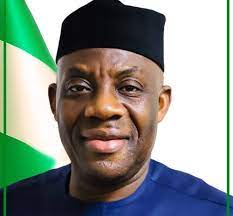By Tony Obiechina, Abuja
The Minister of Education, Dr. Maruf Olatunji Alausa, has called for an urgent and collaborative approach to tackle Nigeria’s educational challenges.
He made the call at the Education Sector Stakeholders’ Consultative Dialogue held on Wednesday at the UBEC Digital Resource Centre, Kado in Abuja.
Speaking to a diverse audience of federal and state officials, development partners, and education advocates, Dr. Alausa emphasized the need for innovation, accountability, and strategic partnerships to revitalize the education sector and unlock the potential of Nigeria’s youth.
The minister who acknowledged the significant support from partners such as UNESCO, UNICEF, USAID, the European Union, the World Bank, the African Development Bank, and the Global Partnership for Education, however, noted that current outcomes remain below expectations. He urged stakeholders to redouble efforts to ensure investments yield measurable results.
Highlighting key statistics, Dr. Alausa painted a sobering picture of the education sector: 20 million children remain out of school, with nearly half having never attended school, and learning poverty reaching alarming levels. These challenges, compounded by a rapidly growing population projected to hit 350 million by 2050, underscore the urgent need for innovative solutions.
Dr. Alausa enjoined all stakeholders—government bodies, development partners, the private sector, and civil society—to embrace a collaborative spirit.
“Education is not just an investment in our children; it is the foundation of our nation’s future. With dedication, innovation, and strategic action, we will transform Nigeria’s education landscape,” he said.
“To address these challenges, the Ministry of Education has outlined three strategic priorities: Equitable Access, Skill Development, and Governance and Data Management. These priorities aim to expand access to education, promote STEM and vocational education, and establish a robust National Education Management Information System (NEMIS)”, he added
Earlier, Dr. Suwaiba Said Ahmad, Minister of State for Education, while welcoming stakeholders, stressed the importance of synergy to overcome challenges such as infrastructural decay, inadequate funding, and teacher capacity development. She reiterated the Ministry’s commitment to achieving inclusive, quality education as outlined in the Sustainable Development Goals (SDGs).
Dr. Layi, Coordinator of the Education Sector Wide Approach, shared the next steps in transforming Nigeria’s education sector include the reactivation of existing structures to improve education service delivery, as well as collaboration with development partners and the private sector to support education initiatives. Technical working groups will be established to drive education sector reforms, and Key Performance Indicators (KPIs) will be developed to measure progress and hold stakeholders accountable.
According to a statement by Mrs Folashade Boriowo, Director of Press & public relations in the ministry, representatives from UNESCO, UNICEF, USAID, the European Union, the World Bank, the African Development Bank, and the Global Partnership for Education (GPE) attended the event, delivering goodwill messages and sharing their valuable contributions and impact in Nigeria’s education sector thus far.
The Education Sector Stakeholders Consultative Dialogue marks the beginning of a renewed commitment to ensuring that every investment in education yields tangible results. With dedication, innovation, and strategic action, Nigeria’s education landscape is set for transformation.
READ ALSO:
- NPFL: Ideye Inspires Enyimba’s Victory Over Nasarawa United
- Popular Catholic priest resigns, switches to traditional religion
- SEC set to improve framework on government borrowings
- 419, Japa, Eba, 17 Other Nigerian Words Added To Oxford English Dictionary
- I’m in Onitsha, not arrested – Peter Obi clarifies


